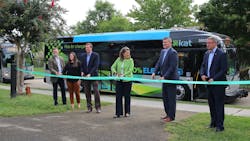Knoxville introduces all-electric buses to KAT fleet
The first all-electric buses have joined the Knoxville Area Transit's (KAT) fleet; local leaders and stakeholders celebrated the milestone with a ribbon-cutting ceremony in Caswell Park.
This order of the first 12 vehicles represents a step toward Knoxville’s clean and resilient future – and progress toward the city’s goal of reducing carbon emissions 80 percent by 2050. Five of the 12 buses have arrived to-date and the rest are due before the end of the year. An additional six vehicles are expected to arrive next year, bringing the total to 18. When the last electric bus arrives, this all-electric group will represent 26 percent of the total fleet, along with another 41 percent being hybrid-electrics vehicles.
“Today marks a dramatic milestone for Knoxville – this is a major step on our path toward a more clean and resilient future for our children and grandchildren,” said Knoxville Mayor Indya Kincannon. “These high-efficiency electric buses are an investment in clean air, in healthy neighborhoods and mobility for our residents.”
A key partner in the electric bus program was Knoxville Utilities Board (KUB). KUB worked with KAT at the outset to ensure that KAT would have enough power to charge as many as 25 all-electric buses in coming years. The charging stations for the first 12 buses are currently being installed.
"This is an exciting day for Knoxville, and KUB is proud to be part of it," said Gabriel Bolas, KUB president and CEO. "KUB supports electric vehicles in our community, and we’re proud to be a partner with the city of Knoxville in building a more sustainable future."
After the inaugural ride with members of city council and other attendees, KAT will begin testing the buses on various routes, training operators in the optimal operating techniques and preparing the vehicles to begin operating in regular service, currently scheduled for January.
For Isaac Thorne, the city’s director of transit, this electric vehicle program is an added benefit to an already available climate solution: transit itself.
“Transportation is the heaviest contributor to climate change in the U.S. Switching some trips to transit can change that, and electric transit holds the key to even greater benefits. By drawing new people to consider transit, reducing reliance on cars, opening up opportunities and providing sustainable mobility choices, transit can make cities more livable, make the air cleaner, and help meet our challenging but achievable climate goals.”
It is expected that the first two bus routes that will see the electric buses in regular service are Routes 17 – Sutherland and 31 – Magnolia Avenue, although, Thorne says, the results of on-street trials over the next few months could change those plans.
